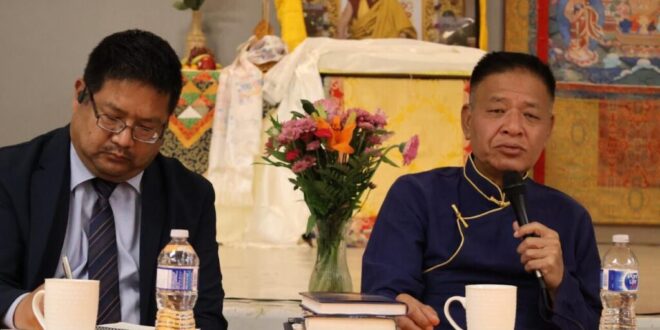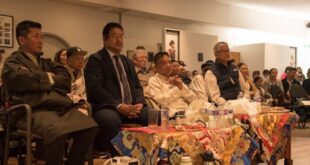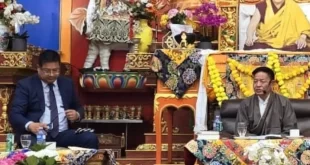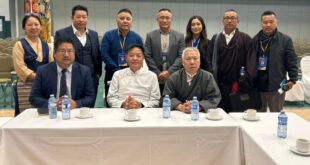Dharmashala: Sikyong Penpa Tsering, the political leader of the Central Tibetan Administration (CTA), made his second official visit to Vancouver Island, Canada, on 26 May 2025. During his visit, he addressed the local Tibetan community at an event organised by the Tibetan Cultural Society of Vancouver Island.
In his address, Sikyong elaborated on the journey of Tibetans into exile and the steady improvement in their livelihoods over the decades. He reflected on the collective resilience of the community, stating, “Upon visiting Tibetan settlements in exile, I have always expressed my deep gratitude to His Holiness the Dalai Lama and the elder generation of Tibetans across all settlements for their unwavering resilience and sacrifices in preserving our identity and community.”
Sikyong acknowledged that the challenges faced by the first generation laid the foundation for future progress, enabling younger generations to access better education, healthcare, and opportunities while continuing to uphold their cultural heritage.
He addressed the local Tibetan community, highlighting the growing importance of population digitalisation as a crucial tool in governance, especially for communities in exile or underrepresented populations. He underlined how digitalisation of population data supports more accurate demographic analysis, enhances the delivery of public services, and enables more informed policymaking.
Sikyong Penpa Tsering further underline the importance of the Middle Way Approach, a visionary initiative proposed by His Holiness the 14th Dalai Lama, which seeks a peaceful and mutually beneficial solution to the Tibet issue within the framework of the People’s Republic of China. His Holiness has long emphasised the long-term and reciprocal advantages of this approach, not only for Tibetans, but also for Chinese society as a whole. Rather than seeking independence, the Middle Way advocates for genuine autonomy for Tibetans, enabling them to preserve their language, religion, culture, and environment.
He also underlined that a nation represents a shared political identity, but within that, Tibetan identity must be recognised and preserved. This is especially important for the three traditional regions of Tibet—U-Tsang, Amdo, and Kham, which together form the cultural and historical heart of the Tibetan nation. The Middle Way Approach ensures that the rights and dignity of all Tibetans, across all these regions, are upheld while promoting harmony and coexistence with the Chinese people.
“As His Holiness the Dalai Lama approaches his 90th birthday this coming July, we all Tibetans have a special responsibility, especially the younger generations of Tibetans and the current 16 Kashag. We must continue to uphold his vision, preserve our identity and work tirelessly to ensure the continuity of our struggle through peaceful means”, he said.
Sikyong Penpa Tsering further spoke on spreading Tibetan identity through Buddhism and compassion. He reflected on the global recognition of Tibetans, noting that much of it has come through Tibetan Buddhism, which has served as a vital cultural and spiritual bridge between Tibet and the international community.
He recalled His Holiness the Dalai Lama’s first visit to Europe in 1973, during which His Holiness focused less on the political situation in Tibet and more on universal values such as compassion, empathy, and the essence of Tibetan Buddhism. Rather than immediately raising the Tibetan cause in his early speeches, His Holiness chose to introduce the importance of cultivating a compassionate heart, spirituality and its emphasis on inner peace and ethical living. This approach deeply resonated with many around the world. As a result, numerous Buddhist organisations and study centres were established in different countries, drawing admiration and interest in Tibetan culture. Over time, this growing spiritual connection led to greater awareness of the Tibetan issue, and more individuals and governments began to support the Tibetan cause.
Sikyong Penpa Tsering said that a strategic and values-driven approach has been key to preserving Tibetan identity and gaining strong international support for Tibet’s ongoing struggle. He urged Tibetans living in exile, especially the younger generation, to continue embracing these values and work peacefully to raise awareness about Tibet’s situation.
Before ending his speech, Sikyong highlighted the significance of this year, marking the 90th birthday of His Holiness the 14th Dalai Lama. He described it as “The Year of Compassion”, encouraging the community to promote His Holiness’ message through his writings and lifelong commitment to peaceful advocacy.
Sikyong concluded by reminding the Tibetan community that following these principles is essential to ensuring a hopeful future for Tibet and its people.
Sikyong Penpa Tsering met with key U.S. government officials during his visit to Washington, D.C., and made official visits to nine locations across North America, including cities in the U.S. and Canada. He gave addresses, engaged, and met with Tibetan communities and youth throughout these Tibetan communities in these locations. The North American tour concluded on May 27, 2025, with his departure from Vancouver Island to Japan.
Throughout his official visit and engagements, Sikyong Penpa Tsering met with key U.S. government officials in Washington, D.C., and conducted official visits to nine locations across North America, including cities in both the U.S. and Canada. He delivered addresses and engaged with Tibetan communities and youth. The North American tour concluded on May 27, 2025, with his departure from Vancouver Island to begin his next official visit in Japan.









